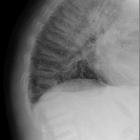Central giant cell lesions (granuloma)



Central giant cell lesions (granulomas), also known as giant cell reparative cysts/granulomas, occurs almost exclusively in the mandible, although cases in the skull and maxilla have been reported.
Epidemiology
It is most frequently seen in young women (F:M 2:1) and typically presents in the 2 and 3 decades.
Pathology
The lesion consists of non-neoplastic vascular tissue, with giant cells and hemosiderin. It is thought to occur as a local reparative inflammatory process likely relating to trauma.
Location
Usually located in the anterior part of the jaw.
Radiographic features
Imaging features are generally nonspecific on both CT and MRI . It begins as a small lucent region, and gradually as it enlarges thin trabeculae of bone become apparent, giving it a honeycomb multilocular appearance. The lesion may demonstrate expansion, root resorption, and erosion through or remodeling of the overlying cortex.
Some authors believe that cherubism (usually considered a form of fibrous dysplasia) is actually a special form of giant cell reparative granulomas .
History and etymology
It was first described by Jaffe in 1953 .
Treatment and prognosis
Primary resected surgically. Recurrence rates of up to 15% have been reported.
Differential diagnosis
On imaging consider:
- brown tumor (osteitis fibrosa cystica): its appearance both radiologically and histologically is very similar to brown tumors of hyperparathyroidism, however patient demographics (and parathyroid function) make the distinction usually simple
- ameloblastoma
- aneurysmal bone cyst
- intracranial tumor
Siehe auch:
und weiter:

 Assoziationen und Differentialdiagnosen zu central giant cell granuloma:
Assoziationen und Differentialdiagnosen zu central giant cell granuloma:



